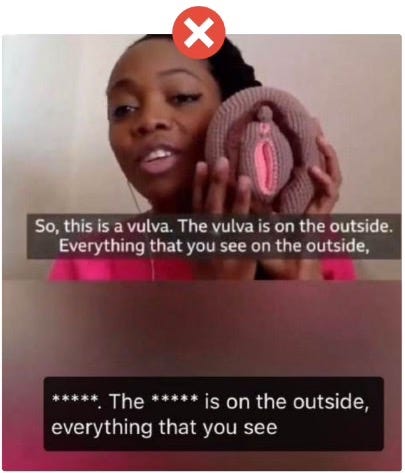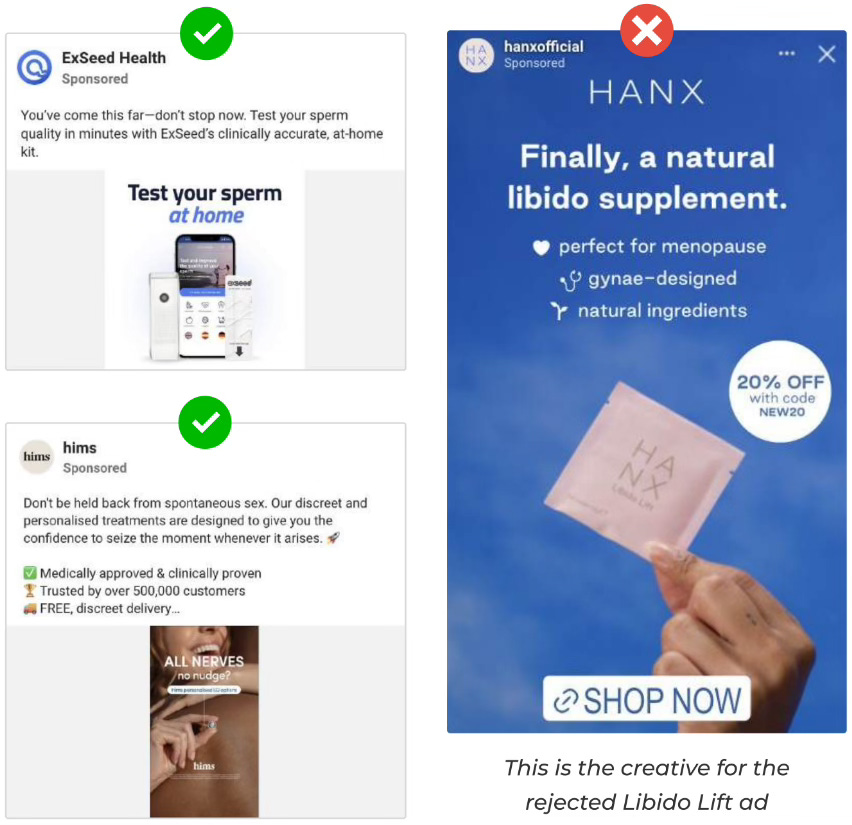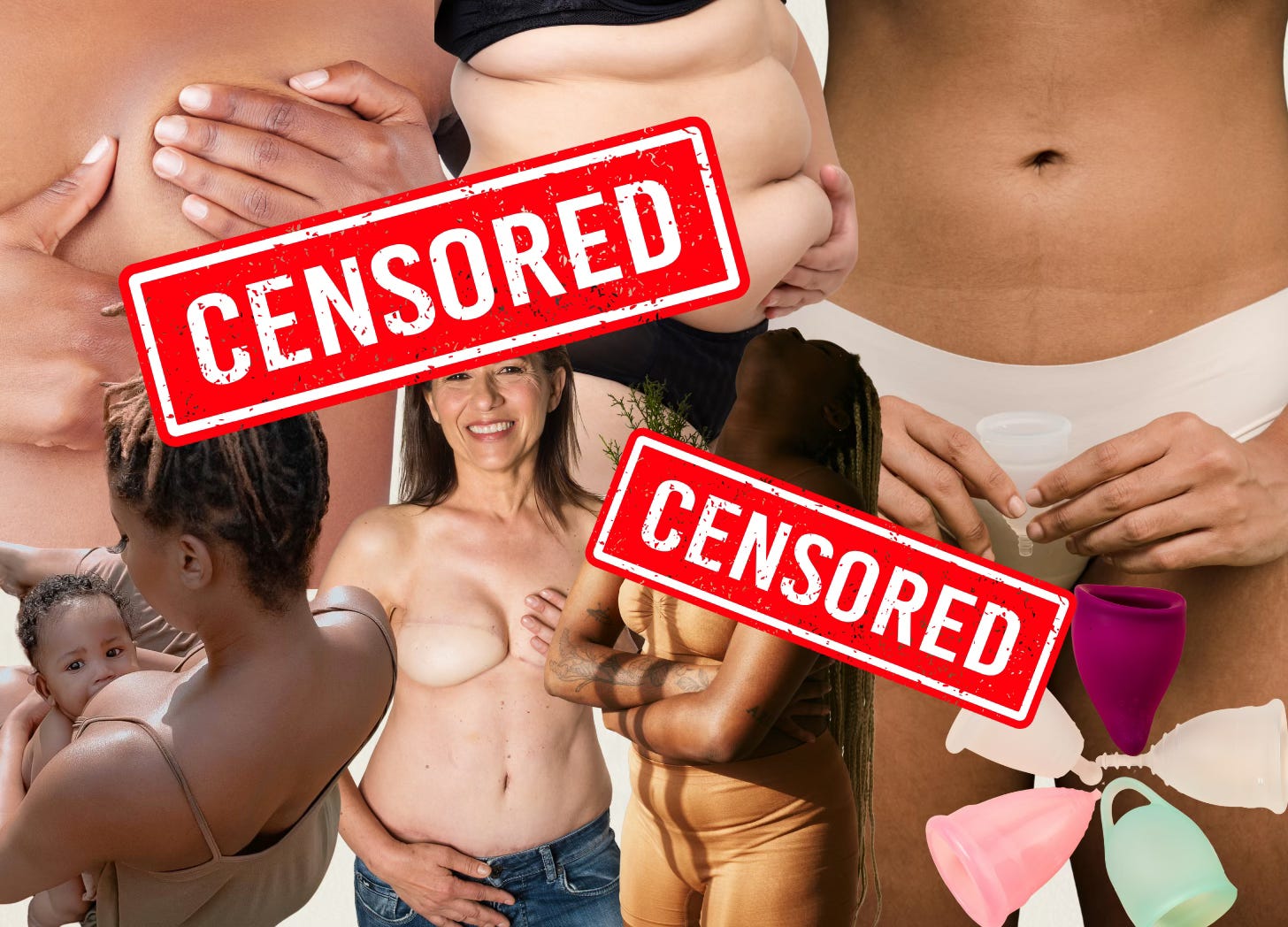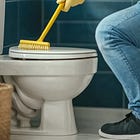Feel you're being silenced when talking about your health? You probably are.
Women’s health is flagged while men’s goes free
By Clio Wood, co-founder of CensHERship
85% of UK women have felt dismissed by a healthcare professional in their lives, according to the government’s own data.
So when that happens, where do you turn? Likely to other sources of advice, like search engines and social media. You’d expect information to be freely available there, right?
Wrong.
I’m a co-founder of CensHERship, and a women's health advocate. My social media content is supportive and signposts to medically-accurate resources. I’m not out to sell you snake-oil solutions.
But on social media, I have experienced censorship and restriction of benign and supportive health posts for women, sometimes with no explanation.
Take Ally Hensley and Ella Mae. Two women with the incredibly rare disease of Mayer-Rokitansky-Küster-Hauser Syndrome (MRKH) in which you are born without a vagina. Both women create supportive content and communities via their Instagram accounts, but both have posts regularly removed or restricted.
Medical educator Dr Aziza Sesay has resorted to using a knitted vulva model in her content highlighting gynaecological conditions, including cancer, in order to be able to accurately describe symptoms.

These are just several examples of the poor algorithmic and moderation systems designed to stifle, rather than protect, medically-accurate women's health content - because I'm not alone.
We recently launched CensHERship's flagship white paper, Censorship Revealed. Our report outlines the problem of digital suppression of women's health content, particularly across social media platforms, highlighting the fact that 95% of women’s health creators have experienced social media censorship on Instagram, Facebook, TikTok and other platforms.
Related articles
Medical information about topics like menstruation, menopause, fertility and postpartum care are restricted for being sexual or explicit.
Equally shocking is the news that 53% of respondents now self-censor, either avoiding women's health as a topic, or severely restricting the way they talk about it.
Both of which mean that women aren’t being allowed to own the conversation around their own health and bodies. This is critical if we want to close the widening gender health gap and end the tyranny of painful years-long diagnoses (endometriosis has an average diagnosis time of 8 years in the UK).
Censorship leads to shame and ignorance about women's health issues like vaginal lubrication and gynaecological cancer, leading to significant ramifications for the way in which we view and treat them.
We're used to seeing emojis or 'v*gina' in place of real words, or bleeped-out rather than spoken; we consider it normal - it isn't

In the business space, female-founded condom and lube brand, Hanx, has around 30% of their digital ads rejected. Whilst adverts for men's erectile dysfunction pills are freely available.
Why is it ok for imagery of women’s bodies to be allowed when framed under the male gaze, but not via a women’s health lens?
When censorship ultimately impacts your health, this isn’t something we’ll shut up about.
Follow CensHERship’s work at censhership.co.uk and log your own experiences at our survey.






Add Fatphobia to that medical censorship and you get a level of distrust that pushes women to the internet, now they are using captions - which was developed as an accessibility tool - to let you know what you're mature enough to learn about. The mental gymnastics are too much. Teenage boys are not in charge of the world - It's up to us to make the world grow up.
I shouldn’t be surprised. It’s so disheartening to hear this. I’ve even seen a lot of women in the comments on breastfeeding informational videos that think it’s gross or taboo to talk about or show. They will even compare it to p*rn*gr*phy and say, “We need to protect the children!!” Some will say to put the breast milk in a bottle, or even suggest foregoing breast milk altogether and to use formula! It’s gotten so bad, I’ve even seen an occasional comment like that on DOG BREASTFEEDING VIDEOS!